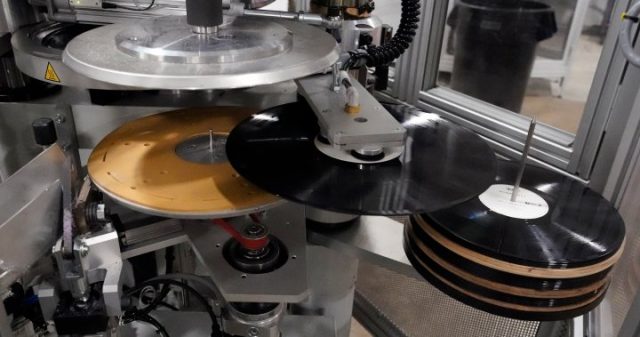Last weekend, I spent a couple of hours at the semi-annual Downtown Record Show in Toronto. I brought along my usual amount of gambling money, $200, and started digging through the crates and boxes looking for … I don’t know, really. Treasure? Something I didn’t know I needed? A lost record from my youth?
After two hours, I gave up, discouraged. I’d bought two things: a Nick Drake compilation (I’m really trying to up my game when it comes to British folk of the 1970s) and a six-CD set of jazz recordings compiled by the Smithsonian (another weak spot for me). Nothing else I saw really sparked any kind of joy.
Maybe I have too many records already (about 7,000, if you must ask). Maybe the thrill of the chase has worn off. Or maybe I just need some new goals when it comes to collecting. Rather than looking for the same-old, same-old, perhaps I should start searching for more weird and extreme stuff.
I’m not talking about another whacko Leonard Nimoy album (he recorded more than a few like The Two Sides of Leonard Mimoy or Japanese ultra-noise from Merzbow. (You can hear a sample of Merzbow on YouTube, and no, nothing is wrong with your device.) No, I mean something extremely specialized, very rare, and highly personal. Let’s call them “DNA records.”
You can add whatever you want into the polyvinyl chloride used to create a record. There are also ways to press specific substances in the vinyl or into the space between two slabs of PVC.
Take, for example, the brand-new release from Fall Out Boy. Earlier this month, they unveiled a special limited edition of their album, So Much (for) Stardust that they call “Crynyl.” The PVC used in the manufacture of these 50 records contains the actual tears from each of the band members (Crynyl/vinyl. Geddit?) Yes, really emo tears for (as the band says) “maximum emotional fidelity.”
When they went on sale for US$99, they disappeared immediately. I haven’t seen any show up for sale on Discogs.com or eBay yet, but it’s only a matter of time. And when a copy does appear, it’ll have a price tag of well beyond the original price. It was created to be a valuable collectible.
This got me thinking: It’s a record with actual band DNA included. Are there more albums like that out there?
Yes. Yes, there are. Here are some records I’m contemplating for my new most-wanted record list.
When I was a kid, I was fascinated when all the members of KISS dropped some of their blood into the red ink for a comic book they were creating with Marvel. Fast-forward to 2012, when Wayne Coyne of The Flaming Lips — a band famous for being a little bent — convinced Coldplay’s Chris Martin, Nick Cave, Erykah Badu, and Ke$sha to contribute a sample of their blood for one of the editions of their Record Store Day release, Heady Fwends.
Those blood samples were sandwiched between two slabs of vinyl and the band sold 10 of them to “interested rich Flaming Lips people” for a starting price of US$2,500 (plus $200 shipping). The money went to the Oklahoma Humane Society.
I just checked Discogs.com to see if any copies were available. There’s one — for $16,320.
Even more extreme was Meredith Graves, vocalist of a band called Perfect Pussy. Three hundred copies of a 2014 album entitled Say Yes for Love had Meredith’s blood pressed into the vinyl. (Stereogum.com has more details if you dare wish to know.) Compared to the Lips’ album, this one is a little more affordable with a current going price of $133.
A super-gross record from a jazz band
Met Eohippus, a jazz combo from Denver. Blood? Boring. They mixed their vinyl with urine. And hair from … somewhere. A hundred copies of a 7-inch entitled Get Your Hair Wet with Pee were made with copies now trading for around $100.
I’ll pass.
Remember the rampaging Stay Puft Marshmallow Man from Ghostbusters? When it came time to release a 30th-anniversary edition of the soundtrack in 2014, Legacy Records packaged the vinyl in a sleeve that smelled of, yes, marshmallows.
Chances are that the candy odour has long dissipated in the decade since it came out — unless you find one still in the shrink wrap. The guide price is around $30.
A deliberately smelly record
A group called Drunk & Horny issued a 7-inch single with scratch and sniff cards. The A-side was called Poop Songs, so you can probably imagine what we’re dealing with here.
Maybe that’s why copies can be had for less than $3.00.
Somehow, the band Emperor Yes got their bands on fragments of an asteroid that hit the planet sometime in the 16th century. Those bits were ground into dust and baked into the vinyl of a record entitled An Island Called Earth.
A copy of this meteorite-infused record can be yours for around $300.
Perhaps the densest and most robust of all storage media is human DNA. Think about it: These strands of protein have to store all the instructions to make a human being with a minimum number of mistakes. Although experiments with DNA storage go back to at least 1999, it wasn’t until ETH Zurich in Switzerland figured out a way to store the digital audio of an album in the same form as genetic information, 920,000 short strands poured into 5,000 glass beads. Those beads are then stored in water and theoretically can be archived for hundreds or even thousands of years.
There have been a few cases where music has been converted to DNA. Back in 2015, the Keutzer Quartet participated in an experiment where some of their music was converted to DNA. The following year, Microsoft demonstrated how a music video — in this case, This Too Shall Pass from OK Go — could be stored this way. They later worked with boffins at UCLA to turn their song Hungry Ghosts into DNA’s A, C, G, and T bases.
I’m most interested in the DNA version of Massive Attack’s 1998 album, Mezzanine, the first full album to be converted to this format. If any copies were ever made available for sale, I’ve never found one.
Some years ago, a company called Andvinyly began offering a service that pressed records out of a loved one’s created remains. The audio for the record could be just about anything the deceased or the family wants it to be: the dearly departed singing or speaking are popular choices.
Most are one- and two-off creations and while rare, probably aren’t that interesting to non-relatives and friends.
Then again, you never know what you’ll find at a garage sale.
Alan Cross is a broadcaster with Q107 and 102.1 the Edge and a commentator for Global News.
Subscribe to Alan’s Ongoing History of New Music Podcast now on Apple Podcast or Google Play


















